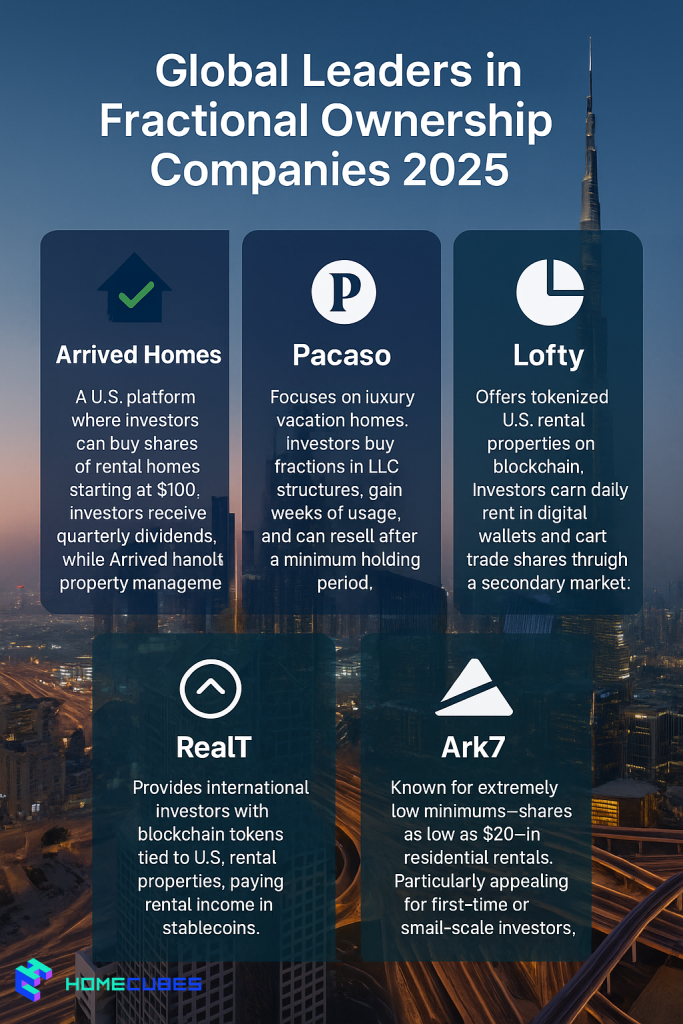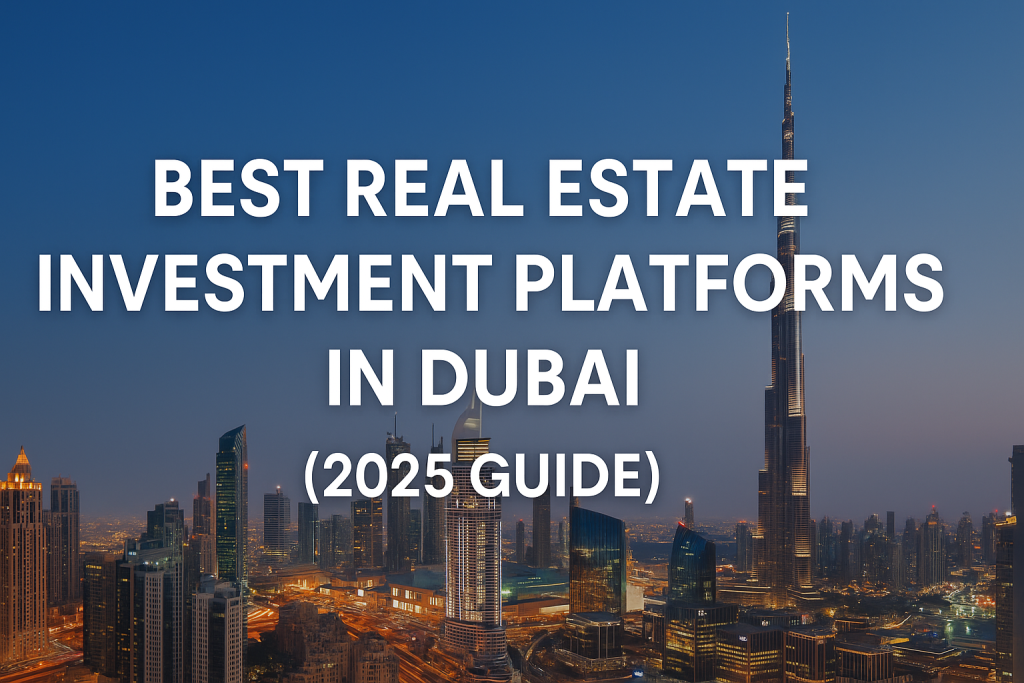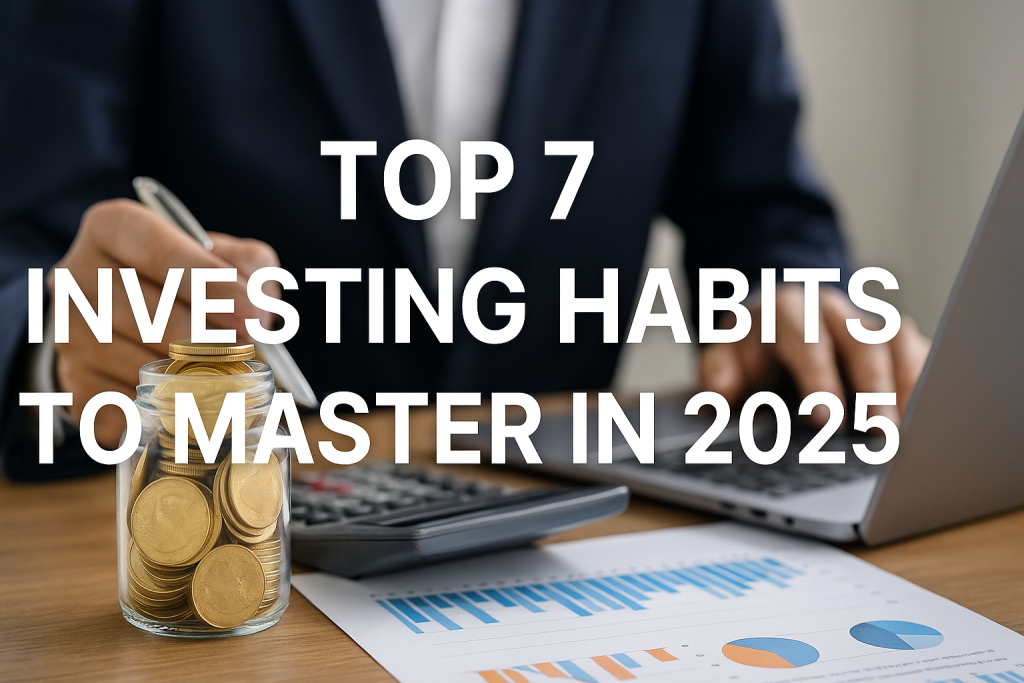

Table of Contents
- Introduction
- Why Fractional Ownership Matters in 2025
- Key Market Drivers
- Global Leaders in Fractional Ownership Companies 2025
- Arrived Homes
- Pacaso
- Lofty
- RealT
- Ark7
- Dubai & UAE Innovators
- Stake
- SmartCrowd
- Dubai Land Department Pilot Programs
- Case Study: Arrived Homes and the Democratization of U.S. Rentals
- Benefits of Fractional Ownership in 2025
- Risks and Challenges Investors Should Note
- Common Mistakes to Avoid
- Fees and Charges Explained
- Future Outlook Beyond 2025
- FAQs
- Final Thoughts
- Homecubes Engagement Section
Introduction
Real estate has always been a cornerstone of wealth creation, but high entry costs and management complexities kept it out of reach for most individuals. In 2025, the rise of fractional ownership companies 2025 is changing this dynamic. These platforms allow investors to buy small shares of properties, making real estate accessible, transparent, and in some cases, more liquid.
The momentum is global. According to Knight Frank’s Wealth Report 2025, real estate allocations among wealthy investors grew by over 30% year-on-year, with fractional ownership highlighted as a structural trend. Meanwhile, CBRE’s U.S. Real Estate Market Outlook 2025 notes that housing affordability pressures and digital platforms are pushing more investors toward alternative access models.
🚨BREAKING: Dubai’s Land Department launches GOV-BACKED real estate tokenization on the #XRPL! 🏙️📲
In partnership with @Ripple, Ctrl Alt & Prycro, Dubai aims to tokenize $16B+ worth of property titles as part of its D33 economic agenda! 🔥🌍 $XRP pic.twitter.com/WHlfCdlmdd
— Xaif Crypto🇮🇳|🇺🇸 (@Xaif_Crypto) July 20, 2025
This article explores the leading global and Dubai-based companies, benefits and risks, and what investors should expect from the future of fractional real estate.
Why Fractional Ownership Matters in 2025

Fractional ownership divides property into shares sold to multiple investors. Instead of one person buying an entire unit, several investors hold stakes, receive rental income, and participate in appreciation.
Why it matters in 2025:
- Accessibility: Low minimums make prime property more inclusive.
- Technology: Platforms integrate blockchain and AI for efficiency.
- Diversification: Investors spread capital across asset types and geographies.
- Liquidity: Tokenization enables resale in secondary markets.
Key Market Drivers
- Rising property prices – In Dubai, both rents and sales have continued upward. Bayut’s H1 2025 Dubai Rental Market Report shows notable increases across key districts, underlining the appeal of fractional entry.
- Generational demand – Millennials and Gen Z, accustomed to digital platforms, are more willing to experiment with fractional ownership models.
- Institutional recognition – PwC’s Emerging Trends in Real Estate®: Global 2025 identified tokenization and fractionalization as frontier themes shaping global investor behavior.
- Regulatory support – Dubai’s Virtual Assets Regulatory Authority (VARA) and the Dubai Land Department (DLD) are actively piloting frameworks for tokenized real estate.
Global Leaders in Fractional Ownership Companies 2025

Arrived Homes
A U.S. platform where investors can buy shares of rental homes starting at $100. Investors receive quarterly dividends, while Arrived handles property management.
Pacaso
Focuses on luxury vacation homes. Investors buy fractions in LLC structures, gain weeks of usage, and can resell after a minimum holding period.
Lofty
Offers tokenized U.S. rental properties on blockchain. Investors earn daily rent in digital wallets and can trade shares through a secondary market.
RealT
Provides international investors with blockchain tokens tied to U.S. rental properties, paying rental income in stablecoins.
Ark7
Known for extremely low minimums—shares as low as $20—in residential rentals. Particularly appealing for first-time or small-scale investors.
Dubai & UAE Innovators
Stake
Based in Dubai, Stake allows investments from as little as AED 500 in pre-vetted apartments. It is licensed in the DIFC and focuses on regulated, investor-friendly structures.
SmartCrowd
The first DFSA-regulated digital real estate platform in the MENA region based on UAE regulation on asset tokenization. It pools funds to purchase Dubai apartments, distributing rental returns and capital appreciation.
Dubai Land Department Pilot Programs
The DLD has launched real estate tokenization pilots to create tamper-proof registries and support fractional ownership in line with Dubai’s Smart City agenda.
Case Study: Arrived Homes and the Democratization of U.S. Rentals
When Arrived Homes launched, it sought to simplify real estate investing. Instead of needing thousands for a down payment, investors could buy in with $100. The platform handled tenant sourcing, legal structuring, and management.
By 2025, Arrived had expanded to hundreds of properties across multiple U.S. states, demonstrating that fractional ownership can scale into mainstream adoption when backed by compliance and technology.
Benefits of Fractional Ownership in 2025
- Lower barriers: Entry points as small as $20 or AED 500, so makes fractional Dubai real estate investment easy for a wide range of investors.
- Passive income: Investors receive regular rental yields without direct involvement.
- Diversification: Ability to spread investments across properties, cities, or even continents.
- Professional oversight: Property management is handled by experts.
- Potential liquidity: Tokenized models allow quicker resale compared to full property transactions.
Risks and Challenges Investors Should Note
- Regulatory uncertainty: Some jurisdictions lack clear rules.
- Liquidity concerns: Not all platforms offer active resale markets.
- Platform solvency risk: Dependence on the operator’s financial health.
- Market cycles: Declines in rental demand or pricing affect returns.
- Fee structures: Hidden or high fees can reduce net yields significantly.
Common Mistakes to Avoid
- Investing only in one property or city without diversification.
- Ignoring fee structures and focusing solely on gross yield.
- Falling for unrealistic return projections.
- Skipping regulatory checks on platforms.
- Overlooking resale restrictions or lock-up periods.
Fees and Charges Explained
Fractional real estate platforms typically charge:
- Acquisition fees: 1–3% upfront.
- Management fees: 0.5–1% annually, or a portion of rental yield.
- Exit fees: Around 2–3% when selling shares.
- Transaction costs: May include trustee, legal, or registry fees.
These charges vary by platform and property type but directly affect investor outcomes.
Future Outlook Beyond 2025
Fractional ownership is not just a passing trend—it’s a new layer of the real estate ecosystem. Several developments are expected:
- Greater adoption of blockchain tokenization for ownership and settlement.
- Integration with DeFi lending to use property shares as collateral.
- Entry of institutional investors into fractional structures.
- Expansion of Dubai as a global hub for regulated tokenized property offerings.
According to JLL’s Global Real Estate Outlook 2025, real estate will remain central to global portfolios, with digital models reshaping investor participation.
FAQs
- What are fractional ownership companies 2025?
They are platforms enabling shared ownership of property in 2025, giving investors proportional rental income and appreciation. - Is fractional ownership legal in Dubai?
Yes. Licensed platforms like Stake and SmartCrowd operate under DIFC/DFSA oversight, while DLD is testing tokenization pilots. - What’s the minimum investment?
Some U.S. platforms allow $20 entries. In Dubai, minimums start around AED 500. - What returns are typical?
Bayut’s 2025 report suggests Dubai rental yields average 5–8% annually. In the U.S., typical yields range from 3–6%. - Can I sell my shares?
Liquidity varies. Tokenized platforms often offer secondary markets; others restrict exit until property sales. - Do investors have legal rights?
Yes. Usually via SPVs or tokenized registries linked to property deeds. - What risks exist?
Regulatory uncertainty, liquidity gaps, platform risk, and market downturns.
Final Thoughts
The rise of fractional ownership companies 2025 highlights a profound change in real estate investing. What was once reserved for wealthy individuals is now accessible to anyone with a few hundred dollars. From U.S. startups like Arrived and Pacaso to Dubai’s regulated platforms, the industry is rapidly expanding.
The benefits are clear—accessibility, diversification, and passive income—but so are the risks. Fees, liquidity, and regulation must be carefully considered. As the market matures, fractional real estate is set to become a mainstream gateway for global investors.
Homecubes Engagement Section
At Homecubes, we are committed to making Dubai’s real estate market accessible through fractional property tokenization. Our mission is to combine transparency, affordability, and regulatory compliance to help investors participate in one of the world’s most dynamic property markets.
We have already applied for our real estate tokenization license with VARA (Dubai’s Virtual Assets Regulatory Authority). Our platform will launch once approval is secured, ensuring compliance with Dubai’s robust legal framework.
Until then, we’re building an investor-friendly ecosystem that will simplify participation in fractional property.
👉 Connect with us today to stay informed and be among the first to explore tokenized property opportunities once we go live.










